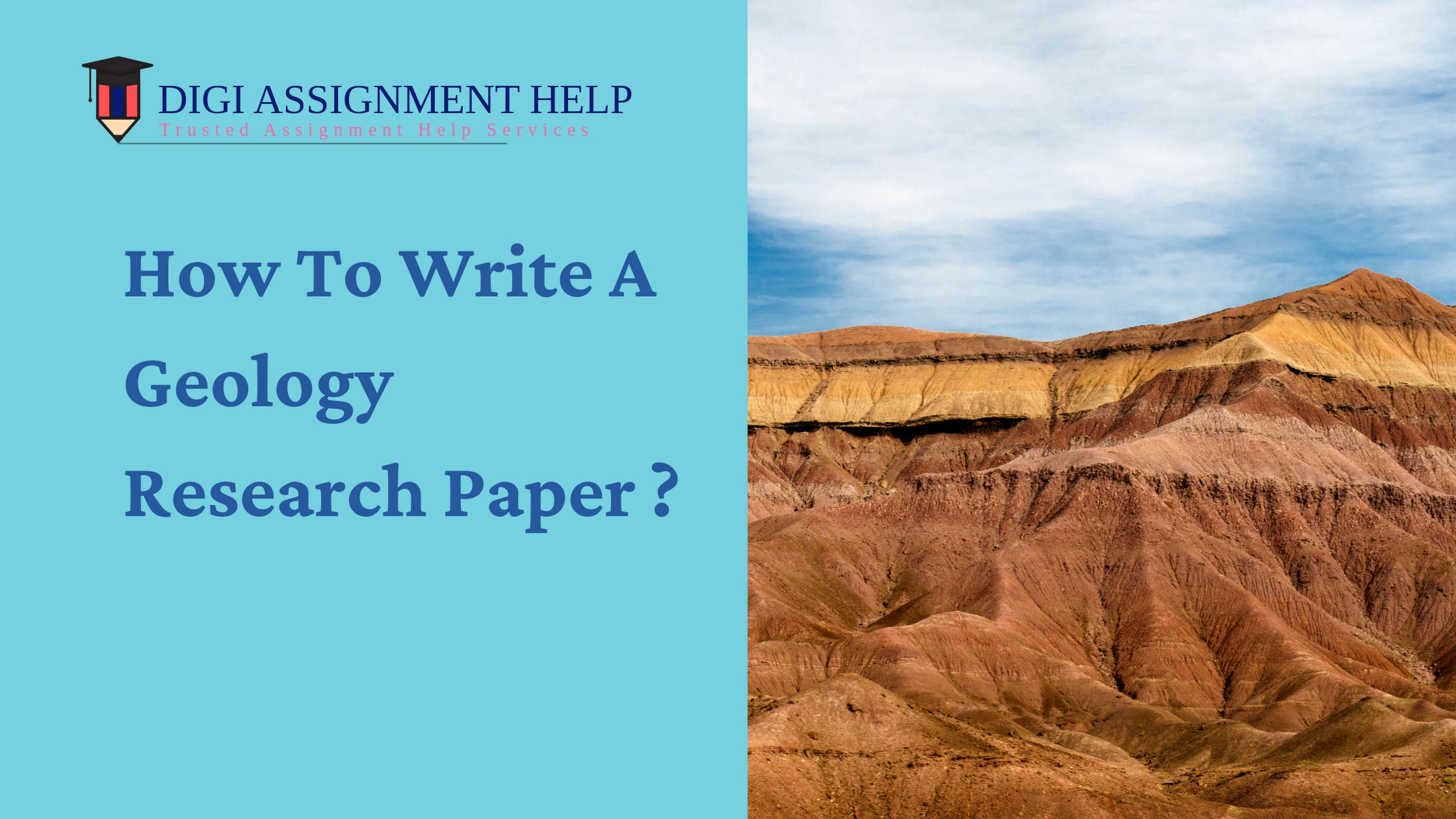How To Write A Geology Research Paper?
 03-Sep-2024 05:57 AM
03-Sep-2024 05:57 AM

How To Write A Geology Research Paper?
Writing a research paper on geology requires not only impeccable writing skills but also a deep understanding of the subject matter. The research papers require students to go into scientific research and use critical thinking. This helps to write an effective essay.
Geology is the study of the substance and physical structure of Earth. It calls for a rigorous approach to writing and research. Writing a strong research report is crucial for academic and professional success.
Australia is a perfect place to start this course as it is a land of abundance. Its natural resources and diverse landscapes make geological studies especially important. This tutorial will help you through every stage of the research paper writing process. You will learn how to select the right topic and finish it right.
Choosing a Field of Study
Choosing a relevant and engaging topic is the first stage of starting your writing journey. While choosing your topic you should consider your interests. Also, consider the scope of the course or program and other factors. All these factors play an important role in the process:
-
Relevance: Make sure the subject is relevant to any ongoing geological research or problems. This will give you access to resources. You can also hold discussions with the resources. Some of the fields available are Mineralogy, palaeontology, and volcanology.
-
Specificity: Your study will be easier to handle if your topic is narrowed down. Consider a more focused topic, like “The Impact of Volcanic Activity on Australian Landscapes,” rather than going with a general one like “Australian Geology." It will save you time for research.
-
Researchable: Select a subject that offers adequate study sources. There should be enough available data. Before deciding on a topic, look through books, and ensure there is reliable material available. You can also refer to scholarly publications, and internet databases for relevant information. Once you've chosen a subject, polish it into a precise research question or hypothesis. This will direct your search. You won't waste time looking for resources and hence will keep up with the pace.
Undertaking Early Research
Conducting an initial study will give you an upper hand. It will help you to grasp the issue better and to write about it. Here is how you can proceed with this:
-
Literature Review: Analyse earlier papers and writings on the subject you are writing about. This will help you to know the important research points. You can choose the hypotheses, and draft conclusions accordingly. Reviewing it will help to write a crisp paper. Make a note of any research gaps that you notice. You can fill the gaps in your documents.
-
Data Collection: You may need to gather data through fieldwork, experiments, or the study of pre-existing datasets. The mode of study is dependent on your topic. You might have to look at geological maps, analyse fossils, or collect samples of rocks in geology.
-
Creating a Statement of Thesis: While creating a thesis use the information from your initial search. This will help to create a thesis statement that sums up the goals of your paper. Your thesis should point out your main arguments for the question you are trying to address.
Providing An Overview Of Your Work
A well-organised outline is essential to write a paper. It will help you to structure your writing and arguments. Your paper's outline acts as a road map. It ensures that your ideas make sense as you move from one section to the next. It keeps the flow. An outline for a geology research paper often consists of the following:
-
Introduction: In this section, State your thesis statement. You can briefly discuss your topic, and give some background information. The context for your study and the importance of the subject should be covered in the introduction.
-
Literature Review: Provide a summary of the literature on your subject. It emphasises the important studies and results. Talk about how your findings relate to the larger field of geological investigations. You can use the arguments of other scholars with due credit.
-
Methodology: Give an account of the methods you used to carry out your study. You can provide information about data collection methods. This section will cover the various analytic strategies and any instruments or tools used. In geology, you might use many fieldwork methods. You may also use laboratory analysis or computer simulations.
-
Results: Summarise the conclusions drawn from your study. To visually represent your data, you can use figures, tables, and graphs. When describing your findings, use precise language. refrain from using descriptive language.
-
Discussion: Talk about your findings and how they relate to your thesis statement. Talk about how your research advances knowledge on your subject and the course as a whole.
-
Conclusion: In this section, Restate the importance of your research. You can highlight the main ideas of your work and offer possible directions. This will help with the further study in the conclusion.
-
References: Using the proper citation style like APA, MLA, or Chicago is highly important. You should list all the sources you cited in your paper. This should be done in the bibliography or reference section.
Editing and Revision
Spend some time editing and revising your work. Never submit your first draft. This step is essential for polishing your work and making sure it satisfies academic criteria. Think about taking these actions:
-
Review content: Examine the content to make sure all of the parts are finished. Ensure you have included enough evidence to support your work. Throughout the article, make sure your thesis statement is handled clearly and concisely.
-
Verify the Structure: Make sure the logical structure and the outline of your paper are coherent. The overall flow should be logical, with each segment flowing naturally into the next.
-
Correct for Clarity: Check the clarity and brevity of your paper. Remove any unnecessary phrases or words that are repeated. Make certain that your writing is easy to understand. It should be understandable to people who are not familiar with the topic.
Finishing and Submitting
Once your paper has been edited and revised, it should be ready for submission. Verify the following one more time before submitting:
-
Compliance with rules: Make sure that the word count, formatting, and citation style of your paper comply with the guidelines. This will make a good impression and gain brownie points.
-
Title and Abstract: You can include an abstract or title page. This abstract should cover the research question, methodology, findings, and conclusion. It makes it easier to navigate the paper.
-
References: Ensure that the reference section cites all of the sources. Make sure your citations adhere to the right format and are accurate.
-
Final Proofread: Go over your work one last time to make sure there are no more mistakes or inconsistencies. Your first draft might be full of grammatical errors and gaps. Editing covers all these spots making your paper flawless.
In summary
It can be difficult yet enjoyable to write a geology research paper. It calls for careful planning, extensive research, and effective communication.
Our professionals at Digi Assignment Help are aware of the difficulties students face while doing the paper. Our assignment writing papers follow the right procedures. We produce a well-structured, insightful paper that adds to the understanding of your subject.
A skillfully written research paper demonstrates your capacity for carrying out thorough research and successfully presenting your results. Our writing experts cover all topics and are familiar with the methodology and style.
If you are dedicated to academic rigor and pay close attention to details, you can contact our geology experts who provide papers matching the highest standards of scholarship.
Top Blogs
|
How To Write A Impressive Thesis Statement
|
||
|
|
||




























 +44 74 8881 8568
+44 74 8881 8568